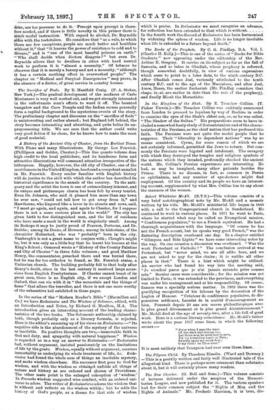Robert Whittaker MoAl2. (R.T.S.)—This volume consists of a very brief
autobiographical note by Mr. McAll and a memoir written by his wife. Mr. McAlrs ministerial life began in 1848 with a call to the Congregational church in Sunderland. He continued to work in various places. In 1871 he went to Paris, where he started what may be called an Evangelical mission, "Conferences popuLsires," to use a French equivalent. He had a thorough acquaintance with the language. "Of course he has not the French accent, but he speaks very good French," was the flattering description overheard one day. In a chapter entitled "Glimpses and Side Lights" we have some interesting notes by the way. On one occasion a discussion was overheard. "Was the work Protestant or Catholic ? " The conclusion arrived at was Protestant, but "never mind, we are all alike here, and we are not asked to pay for the chairs ; it is unlike all other places in that." There is a hint which might be utilised. An ouvrier who had found his way into the meeting said, " Je viendr-ai parce que je n'ai jamais entendu prier comma eels." Secular cares were considerable ; for the mission was not limited to Paris; it was extended to the provinces, and everything was under his management and at his responsibility. Of course. finance was a specially serious matter. In 1892 there was the gratifying recognition of his labours by the decoration of the Legion of Honour. " Createur de conferences populaires, de dis- pensaires modicaux, Laureat de In societ6 d'encouragement au bien. Poursuit depuis 20 ans son ceuvre philanthropique avec le plus grand devouement at le plus grand desinteressement." Mr. MeAll died at the age of seventy-two, after a life full of good work. Here is a curious literary coincidence. Mr. McAll's father wrote about the year 1817 some lines, in which the following Maus :— "Jesus when I pass the wave Of the dark and stormy se., Let thine arm be stretched to save, Fix ivy trembling heart on Thee; Sweetly spare my every tear; 0 my kalot ! be Thou. near."
It is most unlikely that Tennyson had ever seen these lines.. .


































 Previous page
Previous page